- Home
- Medical news & Guidelines
- Anesthesiology
- Cardiology and CTVS
- Critical Care
- Dentistry
- Dermatology
- Diabetes and Endocrinology
- ENT
- Gastroenterology
- Medicine
- Nephrology
- Neurology
- Obstretics-Gynaecology
- Oncology
- Ophthalmology
- Orthopaedics
- Pediatrics-Neonatology
- Psychiatry
- Pulmonology
- Radiology
- Surgery
- Urology
- Laboratory Medicine
- Diet
- Nursing
- Paramedical
- Physiotherapy
- Health news
- Fact Check
- Bone Health Fact Check
- Brain Health Fact Check
- Cancer Related Fact Check
- Child Care Fact Check
- Dental and oral health fact check
- Diabetes and metabolic health fact check
- Diet and Nutrition Fact Check
- Eye and ENT Care Fact Check
- Fitness fact check
- Gut health fact check
- Heart health fact check
- Kidney health fact check
- Medical education fact check
- Men's health fact check
- Respiratory fact check
- Skin and hair care fact check
- Vaccine and Immunization fact check
- Women's health fact check
- AYUSH
- State News
- Andaman and Nicobar Islands
- Andhra Pradesh
- Arunachal Pradesh
- Assam
- Bihar
- Chandigarh
- Chattisgarh
- Dadra and Nagar Haveli
- Daman and Diu
- Delhi
- Goa
- Gujarat
- Haryana
- Himachal Pradesh
- Jammu & Kashmir
- Jharkhand
- Karnataka
- Kerala
- Ladakh
- Lakshadweep
- Madhya Pradesh
- Maharashtra
- Manipur
- Meghalaya
- Mizoram
- Nagaland
- Odisha
- Puducherry
- Punjab
- Rajasthan
- Sikkim
- Tamil Nadu
- Telangana
- Tripura
- Uttar Pradesh
- Uttrakhand
- West Bengal
- Medical Education
- Industry
High density PRISM mapping improves ablation results for persistent AF: JAMA

Persistent atrial fibrillation (AF), a challenging condition to manage, has often shown limited response to catheter ablation. A novel approach known as periodicity and similarity (PRISM) mapping has demonstrated remarkable success in a prospective randomized clinical trial for Persistent AF treatment, conducted across three centers in Asia. The outcomes were published in Journal of American Medical Association.
In this trial conducted between June 2019 and December 2020, patients were assigned to either the PRISM-guided approach (group 1) or the conventional approach (group 2) at a 1:1 ratio. The primary outcome measured was freedom from AF or other atrial arrhythmias lasting longer than 30 seconds at 6 and 12 months.
The results found that patients in the PRISM-guided group exhibited a significantly higher rate of freedom from AF at the 12-month mark compared to those in the conventional group (70.6% vs. 47.1%). Multivariate analysis further underscored the efficacy of the PRISM-guided approach, revealing a hazard ratio of 0.53 (95% CI, 0.33-0.85), signifying a substantial reduction in the recurrence of atrial arrhythmias.
The PRISM mapping technique, which analyzes waveform similarity and recurrence patterns through high-density mapping, offers a promising advancement in guiding the ablation process for persistent AF. This specific substrate ablation strategy not only reduced the frequency of recurrent AF but also increased the likelihood of maintaining sinus rhythm.
This study is important in the field of AF treatment, providing hope for improved outcomes and potentially paving the way for a more effective and targeted approach to catheter ablation. As the medical community eagerly awaits further validation and adoption of this innovative strategy, the PRISM mapping approach emerges as a beacon of progress in the evolving landscape of cardiac arrhythmia management.
Reference:
Lin, C.-Y., Lin, Y.-J., Higa, S., Tsai, W.-C., Lo, M.-T., Chiang, C.-H., Chang, S.-L., Lo, L.-W., Hu, Y.-F., Chao, T.-F., Chung, F.-P., Liao, J.-N., Chang, T.-Y., Lin, C., Tuan, T.-C., Kuo, L., Wu, C.-I., Liu, C.-M., Liu, S.-H., … Chen, S.-A. (2023). Catheter ablation with morphologic repetitiveness mapping for persistent atrial fibrillation. JAMA Network Open, 6(11), e2344535. https://doi.org/10.1001/jamanetworkopen.2023.44535
Neuroscience Masters graduate
Jacinthlyn Sylvia, a Neuroscience Master's graduate from Chennai has worked extensively in deciphering the neurobiology of cognition and motor control in aging. She also has spread-out exposure to Neurosurgery from her Bachelor’s. She is currently involved in active Neuro-Oncology research. She is an upcoming neuroscientist with a fiery passion for writing. Her news cover at Medical Dialogues feature recent discoveries and updates from the healthcare and biomedical research fields. She can be reached at editorial@medicaldialogues.in
Dr Kamal Kant Kohli-MBBS, DTCD- a chest specialist with more than 30 years of practice and a flair for writing clinical articles, Dr Kamal Kant Kohli joined Medical Dialogues as a Chief Editor of Medical News. Besides writing articles, as an editor, he proofreads and verifies all the medical content published on Medical Dialogues including those coming from journals, studies,medical conferences,guidelines etc. Email: drkohli@medicaldialogues.in. Contact no. 011-43720751


